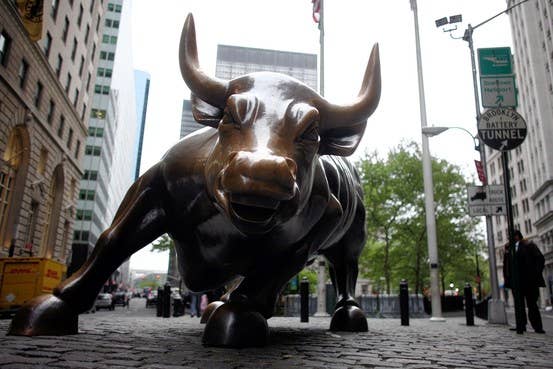Video Game Stocks Bounce Back in 2015
Many game companies saw their shares rise to historic highs - here's how the Western firms fared in the last 12 months
Editor's Note: This is the first in a series of year-end content to be published daily leading up to Christmas that includes analysis, opinion and insights into the biggest news and trends of 2015.
Given the soaraway success of the PlayStation 4, the none-too-shabby success of the Xbox One (eclipsed by the PS4, sure, but doing fine by its own rights) and the continued meteoric rise of mobile and digital game revenues, it probably won't surprise you that this has been a banner year for videogame stocks. The success hasn't been evenly spread around - and there have been some notable failures this year, too - but as the end of 2015 approaches, several videogame companies are trading at prices they haven't seen in almost a decade, and others are exploring historic highs in their valuations. It's not unreasonable to say that for the first time in a while, videogames are back to being investors' darlings.
For this year-end round up of stocks in recognition of the extremely large number of publicly listed Japanese game companies, we've divided them off into a feature of their own; the trials and tribulations of the Tokyo Stock Exchange in 2015 were very different from those of American or European markets, so it makes more sense to analyse those stocks separately (that'll be in Part 2 later this week). In this feature, you'll find a round-up of all the major stocks from the US and Europe throughout 2015 to date, so without further ado, to the charts.
Our first chart gives you a quick overview of just how great this year has been for the major publishers. The black line is the NASDAQ index, representing the average performance of US tech stocks during 2015; as you can see, it's been a reasonably torpid year overall, which puts the excellent performance of the game publisher stocks in sharp relief. Take-Two, absent a major GTA release in the year, is the weakest of the bunch, but even at that it's almost doubled the NASDAQ's gains since the start of January - while at the top of the chart, Electronic Arts and Activision have soared, with Activision in particular up almost 90 percent for the year, setting brand new heights for its share price. The company's expansion of its business, especially the acquisition of King, is undoubtedly responsible for some of the late gains - but its investors have clearly been taken with its overall performance over the year as a whole, including the entrenchment of Destiny as a major franchise and the marked excitement over the new Call of Duty (though we're still waiting to see if its sales have halted the series' slow decline).
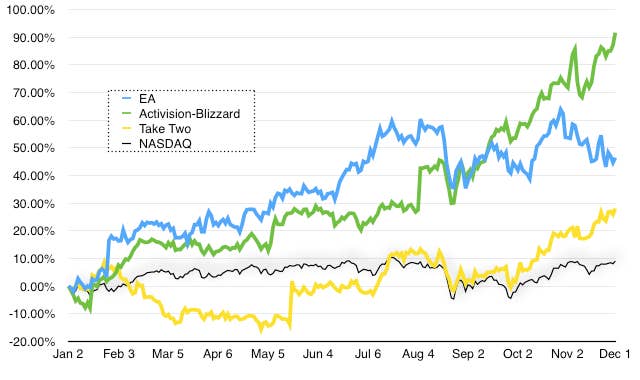
Looking a little more deeply at the contest between Activision and EA, the very early lead which EA took in January was down to a fantastic earnings report and bullish new guidance from the company; but Activision reported its own excellent earnings in August, beating its guidance and reassuring investors with a move towards digital revenues, which allowed it to catch up with and eventually outpace EA's growth. As the year ended, Activision announced a bevy of strategic moves (the acquisition of King, filling a major hole in its product portfolio, being a major one) which boosted its growth towards a spectacular year-end. Depending on how sales figures for Call of Duty hold up in December, it's not impossible that the company will finish 2015 with double the valuation it had at the start of the year - but EA, with nearly 50 percent price growth, is far from shabby.
On the other side of the Atlantic, the only major publicly listed "traditional" publisher is Ubisoft on the Paris Exchange - and here we can see that while, again, the exchange wasn't a dramatic performer for the year (up around 20 percent overall), Ubisoft's value increase since September has been incredibly dramatic. Why? It's not that Ubisoft has anything particularly dramatic on the market right now - Assassin's Creed Syndicate, its biggest game for this autumn, is doing fine but hardly driving the kind of business that would see stock prices leap so high. No, that valuation leap has everything to do with corporate machinations, specifically the acquisition of shares in the firm by Vivendi - a move that was greeted with anger by Ubisoft boss Yves Guillemot, who views Vivendi as a predatory firm whose potential takeover is far from welcome. His shareholders, apparently, do not agree; interest from Vivendi (which also owned a majority stake in Activision Blizzard until the subsidiary bought out the bulk of its own shares in 2013) sent prices rocketing.
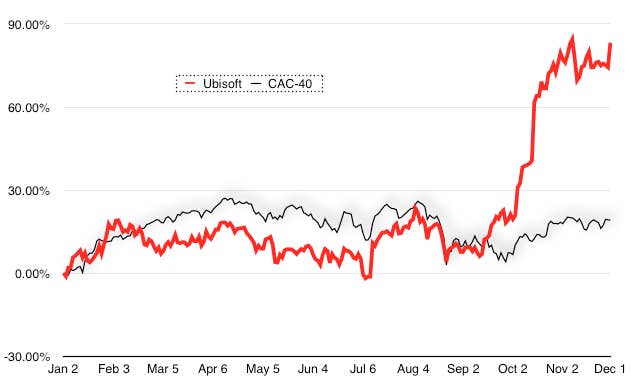
As a general rule we don't put stock prices from different indices alongside one another, as the fundamentals of the markets are very different and the comparisons unfair, but with both the NASDAQ and the CAC-40 index of Parisian shares rolling along at a low, steady rate this year, Ubisoft's performance is actually broadly comparable with the US publishers - so here's a quick graph showing where the French firm now sits in context, in the wake of rumours of aggressive take-over. Yves Guillemot may not like it, but rumours of a takeover have propelled his firm into second place among the traditional publishers for 2015 share price growth.
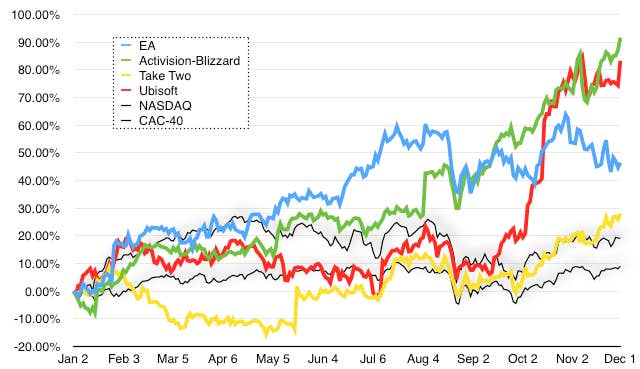
How about Microsoft, the US' console platform holder? In truth, there's not much to be gleaned about Microsoft's gaming business from its share price movements; the company's expansive businesses in operating systems, office software and cloud computing are far more relevant to its share price than the Xbox. Apple, on the other hand, finds its share price almost directly wired to the iPhone, or at least to sentiment around the iPhone; this year its share price hasn't moved much, despite setting new records with the iPhone division, suggesting that as with Microsoft, there's not really a whole lot of connection between the parts of the business relevant to videogames in any way, and the share price itself. In Apple's case, there's a compelling case that the share price isn't really wired to anything real or sensible whatsoever, seemingly jolting around on whims, rumours and idiocy - but for the sake of completeness, we've included a graph of the two "platform holders", so feast your eyes before we move on to the mobile space.
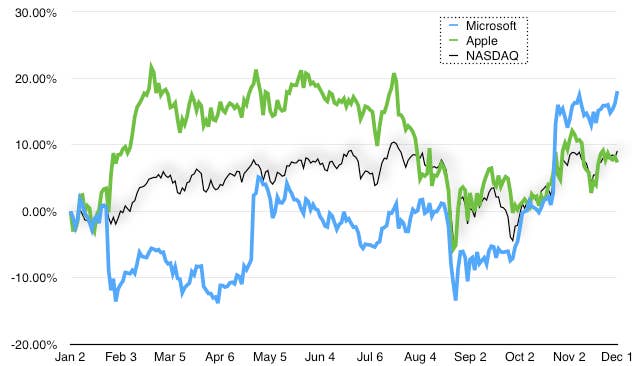
If 2015 has been a great year for traditional publishers, it's been - once again - an unassuming year at best for mobile-first companies. The biggest mover is Gameloft, which also belongs to the Guillemot family and is essentially a sister company to Ubisoft. There's a theory that in the event of a genuinely hostile takeover effort, Ubisoft could quickly merge with Gameloft and thus dilute its shares and boost the Guillemots' control - a strategy called a "poison pill" approach, although that may be neutered by Vivendi's decision to buy large tranches of shares in both companies at the same time.
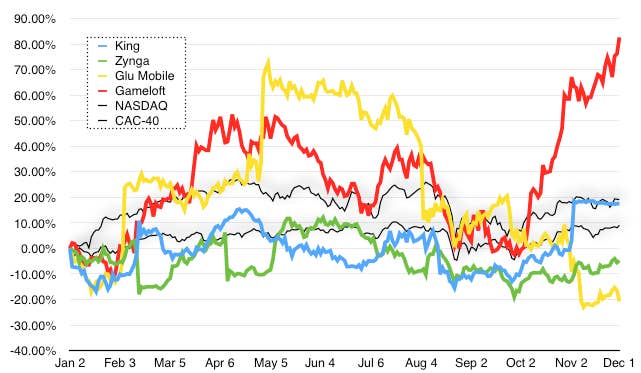
Aside from Gameloft, the biggest performer is King - which plateaus in early November with the announcement of Activision's buyout, and will of course not feature in any charts for the coming year. The premium Activision is paying for the company means that its shares, moribund for most of the year, will end up doubling the gains of the NASDAQ in 2015; a nice bonus for its long-suffering shareholders, though if you'd held on to your shares since the IPO, you'd still be making a loss. Zynga, a company struggling to retain its once-held lustre, underperformed again this year, losing money both in dollar terms and against the NASDAQ index, while Glu Mobile, last year's top mobile performer off the back of its success with the Kim Kardashian brand, had a very bumpy year. Its growth in 2014 carried on to the middle of 2015, with new celebrity licensing deals and good financials helping to nudge the stock price ever higher, but the market soured on Glu in August after a double whammy of reality check - poor quarterly earnings and weaker than expected projections perhaps reminded investors of what Glu's management will have known all along - that the Kardashian success might not be as easy to replicate as simply sticking Britney Spears' or Nicki Minaj's face on the loading screen and rolling in the money all over again. Turning celebrity mobile games into a sustainable business is a tough ask, and fears over the risks involved saw the firm's shares cancelling out their 2015 gains, and then some, in the back half of the year.
With the removal of King from the charts, that leaves only Gameloft, Glu and Zynga as publicly traded mobile publishers in the west - and while the huge number of Japanese mobile publishers on the Tokyo exchange do make up the numbers, the absence in the stock markets of top mobile players like Game of War publisher Machine Zone is very notable. Of course, to some degree that's due to the blurring of the lines with traditional publishers; buying King makes Activision a major mobile publisher overnight, while Electronic Arts has also consistently done pretty well in mobile. Incidentally, it's not just mobile which lacks some major players on the markets - Bethesda, one of 2015's biggest publishers in traditional gaming, is a subsidiary of the privately held ZeniMax.
Contrasting the performance of mobile with traditional publishers suggests that in the US, at least, there's little sign of the "biggest names in gaming" changing any time soon; mobile threats have been met or absorbed by the dominant publishers, and they've come out of a tough transition looking more healthy, and certainly more valuable, than ever before. That's a very different story from the other side of the Pacific, as we'll see when we get around to tackling Japan's stocks later this week.
